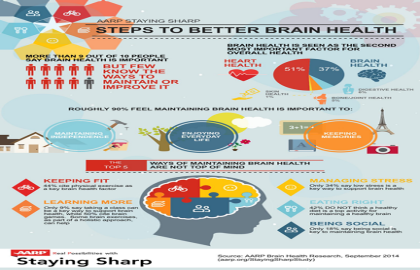WASHINGTON DC—AARP Staying Sharp, an AARP membership option that focuses on a holistic approach to brain health, announced today new survey results indicating adults know the importance of brain health but are not as aware of the recommended holistic approach to improve it. All respondents believe it is important to improve or maintain brain health – with 93% noting it is very or extremely important. When asked how specifically to maintain a healthy brain, a startling low 18% cited socializing with friends or family, 34% cited low stress, 44% cited physical exercise and only half (50%) of survey respondents cited brain games, which is one way to have fun while exercising your brain. AARP Staying Sharp is working to educate members about how a well-rounded healthy living approach can help improve overall brain health.
“We have found that brain health is not just a key concern for our members, but a concern for all Americans,” said AARP Vice President of Membership Lynn Mento. “AARP Staying Sharp isn’t just about brain exercises, but about promoting healthier living as a holistic way to support brain health, by keeping physically fit, learning more by challenging your brain, managing your stress, eating right, and connecting with others.”
The Five Ways to Support Brain Health
AARP Staying Sharp recognizes that many people are proactively working to keep their minds sharp so that they can continue to live active, fulfilling and independent lives. AARP’s analysis of current research suggests that people interested in maintaining and improving their brain health should focus on five areas:
- Keeping Fit: Studies show that even small amounts of regular exercise like walking can positively impact brain health.
- Learning More: Everything from learning a new language or skill to participating in online exercises designed to challenge and test the brain.
- Managing Stress: Several studies indicate sleep and stress management improve brain health.
- Eating Right: Scientific research shows that certain elements in food – from omega-3 fatty acids to vitamin E – can positively impact brain health.
- Being Social: Research shows that staying socially connected to other people supports a healthy brain.
Survey Shows Opportunity for Brain Health Education
The survey conducted by AARP and W5 asked 1,200 Americans (age 34 to 75) about healthy living and brain health. While respondents showed some awareness of the five ways to support brain health, there was room to educate many on how to help improve or maintain brain health.
- Keeping Fit: Only 44% noted physical exercise as a key factor to help maintain a healthy brain.
- Learning More: While 50% noted brain games can help maintain brain health, only 9% reported taking classes, 6% said watching educational programs and 5% indicated watching the news.
- Managing Stress: While 68% chose getting adequate sleep or rest to help maintain brain health, only 38% identified low stress as a factor (34%).
- Eating Right: For just 58% a healthy diet is considered key to maintaining brain health.
- Being Social: Only 18% noted being social as a key factor to help maintain or improve brain health, the least likely to be noted as a way to help your brain.
AARP understands that people 50+ are active, engaged, and focused on living life to the fullest. AARP is committed to helping members discover “Real Possibilities” in life, by delivering membership options that have evolved to reflect where members are in life today. The AARP Staying Sharp membership costs $21 a year and provides people with information, tools and resources, and tangible steps to take every day to foster a healthy, holistic lifestyle in support of brain health. Along with all the benefits of traditional membership, Staying Sharp provides access to experts, tools, and resources, focused on maintaining brain health, including:
- Staying Sharp Challenge from Brain HQ: Access to online brain training exercises selected for Staying Sharp members designed to improve cognitive ability, navigation skills, people skills, memory and more.
- Staying Sharp eNewsletter Subscription: Access to up-to-date research and insights around brain health.
- Video Insights Series: Short, web-based video series with science-based tips and suggestions on physical exercise, online and offline activities, food and approaches to support brain health in a holistic way.
To learn more about the brain health Staying Sharp research, visit http://www.aarp.org/StayingSharpStudy. For more information about the AARP Staying Sharp membership, visithttp://www.aarp.org/NewStaySharp.
###
























































